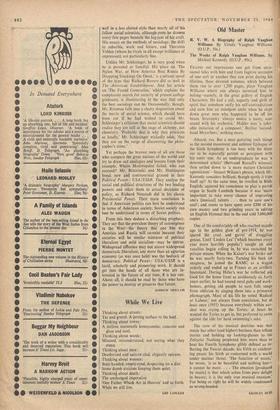Old Master
R. V. W. A Biography of Ralph Vaughan Williams. By Ursula Vaughan Williams. (0.U.P., 50s.) FILLING out impressions one got from occa- sional talks with him and from fugitive accounts of one sort or another that saw print during his lifetime, these devoted volumes, which between them run to over 1,200 pages, place Vaughan Williams where one always surmised him to belong—namely, in the great gallery of English Characters, He had a salt, sagacity and girth of spirit that somehow unify his self-contradictions and earn him 'an indulgent smile when he slaps down great men who happened to be off his beam. Stravinsky 'always makes a nasty, sour sound with his orchestra.' Mahler was 'a toler- able imitation of a composer,' Berlioz 'second- hand Meyerbeer,' nothing more.
Absurd, yes. But a man gestating such things as the second movement and sublime Epilogue of the Sixth Symphony is too busy with the inner ear to be especially patient or percipient with his outer one. As an undergraduate he was 'a 'determined atheist' (Bertrand Russell's witness), then settled down to 'a more mature Christian agnosticism'—Steuart Wilson's phrase, which Mr. Kennedy considers brilliant, though' sprely it trips itself up? At the same time, he revelled in Bible English; squared his conscience to play a parish organ in South Lambeth because it was `more important to take every chance of improving one's [musical] talents . . . than to save one's soul': and seems to have spent over £200 of his own money and two grinding years in editing an English Hymnal that in the end sold 5,000,000 copies.
One of the comfortably-off who reached middle age in the golden glow of pre-1914, he was spared the crust and garret of struggling genius. Until 'Linden Lea' ('which becomes every year more horribly popular') caught on and royalties began rolling in, he was sustained by private means. When the Kaiser's War broke out he was nearly forty-two. Turning his back on snugness, he joined the RAMC as a wagon orderly and ended up in France as an artillery lieutenant. During Hitler's war he collected pig food for the home front as assiduously as, forty years earlier, he had toured rural pubs and Work- houses, getting old people to save folk songs from oblivion by singing them into a primeval phonograph. Most of his life he voted 'Radical or Labour,' not always from conviction, but at least once (1951) because everybody within ear- shot was crying up the Tories; at heart he wanted the Tories to get in, but preferred to swim against the tide for hard swimming's sake.
The core of his musical doctrine was that music has other (and higher) business than telling stories and holding up looking-glasses to the Zeitgeist. Nothing perplexed him more than to hear his Fourth Symphony glibly defined as re- flecting the Fascist decade, his Fifth as celebrat- ing peace, his Sixth as concerned with a world under nuclear threat. The function of music,' he wrote, 'is to be beautiful and nothing less— it cannot be more. . . . The emotion [produced by music] is that which arises from pure delight in beauty; it is the only true musical emotion.' For being so right he will be widely condemned as wrong-headed.
CHARLES REID


































 Previous page
Previous page